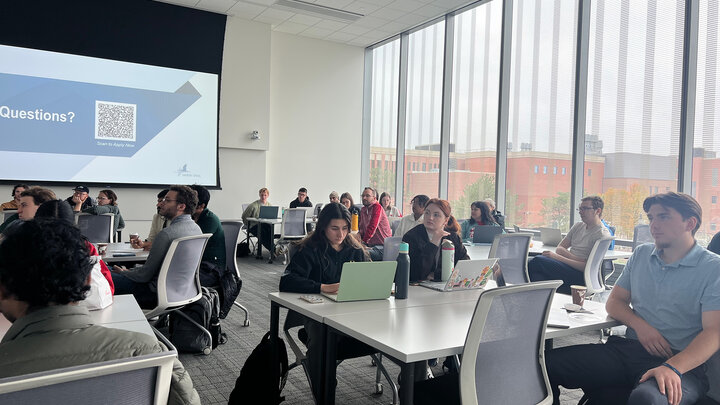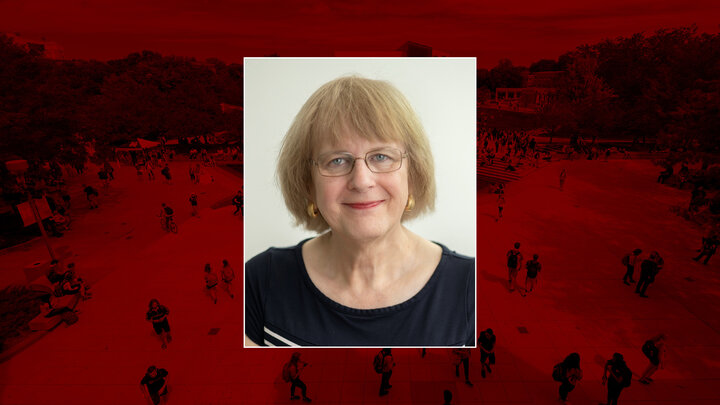The School of Computing is offering a new data science course designed to help students discover real-world application possibilities and potential career pathways through a semester-long series of guest lectures.
The course, “CSCE 386: Practice and Professional Development: Design and Implementation,” presents in-class seminars featuring a wide range of representatives from the local technology industry, government institutions, and the university research community. The lectures focus on various topics ranging from artificial intelligence tools developed at Sandhills Global to data optimization techniques used by Lincoln Fire and Rescue.
This is the first semester the course has been offered in the school. Taught by Associate Professor of Computing Juan Cui, the course was developed with a goal of introducing students to professionals who can share new insights and firsthand experiences that will guide students through college and into their careers.
“The goal is to give students broader exposure to how data science is applied in the real world, so they can have a better understanding of different types of approaches to solve problems and how those methods can vary,” Cui said. “The idea is to introduce them to new concepts while also giving them a chance to practice applying those ideas.”
The School of Computing’s data science program places a strong emphasis on developing professional and interpersonal skills alongside technical skills. Cui noted that many guest lectures have reiterated the importance of learning not only how to accurately collect and analyze data but also how to communicate findings effectively, particularly to non-technical team members and stakeholders.
“We talk about data science principles — data quality, cleaning, modeling — but for anything valuable and impactful to come from the analytics, there has to be effective visualization and communication,” Cui said. “That’s where soft skills come in, and for many students, that’s something new.”
To help students develop these soft skills, the course culminates in a group project, where groups design and present proposals addressing realistic, data-driven problems using concepts introduced in the course.
Alaa Ismail, a senior student in the course, said both the seminars and the project have been highly beneficial for her professional development as well as her problem-solving skills.
“We all know the impact of data, especially with the growth of AI and Big Data, but this course has truly captured the extent of its real-world impact,” Ismail said. “Every speaker has brought a different perspective on how data-driven approaches drive their problem-solving efforts and decision-making. To learn from their professional trajectories and the challenges they face regarding data governance and the growth of AI has been really eye-opening and invaluable.”
Because the course features speakers from such a diverse array of disciplines, it is acquainting many students in the course, like senior Angela Le, with opportunities they previously didn’t realize existed.
“I have really enjoyed listening to the guest talks and hearing different perspectives on how data is used in real-world applications,” Le said. “The variety of presentations across different fields has been fascinating, especially seeing how data connects to so many aspects of work and research.”
In addition to offering students a chance to survey a broad range of data science applications, CSCE 386 guides them in strategically selecting electives and exploring complementary areas of study that align with their interests. Designed to be an interdisciplinary major, the School of Computing’s data science program encourages its students to choose a second major or additional focus areas in these subjects to enhance and expand their knowledge.
Le added that the course has allowed her to not only explore opportunities in fields like firefighting, geospatial analysis, and marketing, but also understand how each uses data and tools differently.
“It has been fascinating to see how different fields handle their data. Each area uses unique security practices and analytical methods to ensure accuracy and prevent mistakes,” Le said. “Learning about these variations has given me a deeper understanding of how data management adapts to different industries and purposes.”
Cui said while the course was created specifically for data science majors, she imagines that will change and the course will expand in the near future.
“I'm convinced that this course can be beneficial for all students in the school, not necessarily limited to data science,” Cui said. “I even think this might be the beneficial for our faculty as well, because when speakers talk about their data challenges and what they need, it aligns with some of the research of our faculty.”
Ismail agreed that the course has been an impactful and important piece of her undergraduate education.
“Data and problem-solving are core components of my professional interests,” Ismail said. “The skills, methods, and professional networks I have gained from this course have opened up many doors that I otherwise may not have entered in my undergraduate experience.”
Ultimately CSCE 386 provides students with a unique chance to gain valuable knowledge they typically wouldn’t in a single seminar or standard college course.
“College is not just about learning computer science, data science, or programming and analysis tools. It’s really about learning how to think critically, approach complex problems, and find solutions,” Cui said. “I think this course provides a valuable experience for students with ideas in mind, allowing them to get direct feedback from those who have been through it. That’s something beyond what we can normally teach in a lecture.”




